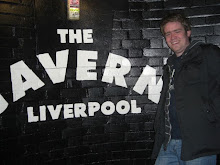
I meant to post this last week, but time got away from me.. Missed Regan's gig last Saturday as well, unfortunately, but better late than never to post this interview..
THE DELIGHTFULLY idiosyncratic Fionn Regan is something of a national treasure, a sort of modern wandering troubadour in the mould of Drake and Dylan, complete with bizarre bowl haircut, cherubic face and an ability to speak in wonderfully meandering metaphoric language.
Thankfully, his songs are damn good too, from the whimsical and joyous Mercury Music Prize nominated folk debut The End of History, to the visual and visceral recent follow-up The Shadow of an Empire, which has seen the Bray man develop a sort of electric swagger to his tempo.
While you might be forgiven for thinking Regan has been resting on his laurels since that 2006 debut, that couldn’t be further from the truth. An incessant period spent touring, particularly Stateside, has taken up much of the last four years, but Regan still found time to record not one, but two follow-ups to his debut.
The first was an uncompromising recording made in conjunction with Kings of Leon producer Ethan Johns, but was not what Regan’s American label wanted, and as a result, both parties went their separate ways, a parting Regan has likened to a divorce. He returned to Ireland and recorded and produced Shadow of an Empire in an old biscuit factory, and as a result, when he spoke to On the Beat recently, he described himself as “busting at the hinges” to get it out.
“I took on quite a lot of touring for The End of History,” he explains, in one of the more straightforward answers in a beguiling conversation. “I came off the road in 2008 and made a record with Ethan Johns, which got clamped on the docks with red tape wrapped around it, so I had pull out of the drive, and make another record. So in a sense I have made three (records).”
“I suppose what I am saying is that I have been flat out and sometimes people think that you have been sitting beside a swimming pool drinking a cocktail or something, but actually within the walls of the story, the turnaround has been remarkable. It has been very fast.” He adds, with a laugh: “There is a lot of trip wire around, and before you know it, it can be two inches into your shin, then you have to learn how to dance”.
Red-tape and label issues aside, it is clear that there has been a huge turnaround in musical styles on Regan’s follow-up album, as he moves to a sort of folk-punk rockabilly style, punctuated by plenty of anger and dark mutterings. Take the electric-polka beat of Violent Demeanour, a key track on the album, which seems to hint at mental illness, or the nod to drug addiction on Catacombs, or the swaggering, jangly, Dylan-esque opener Protection Racket; all of these seem to point to Regan changing tack, away from his softer musings.
These may have been influenced by Dylan Thomas and Jack Kerouac, who he namechecks, but Regan remains conflicted about a drastic seachange in his style, it seems.
“The thing about the End of History, that came about because the only way I could get around was by travelling with an acoustic guitar and sleeping on couches,” explains Regan. “Eventually, when it got released in America, I could take a drummer along with me, so then you have a different set of tools around you, so you can do a different thing, but everything has its own natural leaning. It is well and good if you repeat something if it resonates with you, if it is the truth, but if it isn't, you can't.”
“Ultimately (the new record) is not very different at all, the lyrics, and the person are still there at the centre of it. Maybe when you break it down into different compartments, aesthetics and this that and the other, maybe the musical language has changed a little bit, but the centre pole remains the same,” he adds.
Taking a reference point from “the pop songs of the 60s”, Regan has released an album full of its idiosyncrasies and quirks, which was driven by a certain amount of trial and error, as he reveals in his singular way.
“When you are on the ship and the captain is not at his perch, someone needs to grab the wheel, that is the way it has worked out with me so far, I have to grab the wheel, and in a way it saves time for me to do it that way... I locked antlers with myself and pushed myself - and when there are too many other people doing that, it makes the process harder.”
He says he is looking forward to getting back out on tour, but that period won’t be as long as it was after his debut.
“Probably not. That was a very unique situation. Sometimes, that is one of the learning curves - to me it is more important to document future records, and make sure that the turnover is faster.”
“I learnt an incredible amount and got to see the world - but this time, I don't see myself touring for two and a half years, which is the simplest way of putting it I suppose,” he adds with a laugh.
The Shadow of an Empire is out now.






